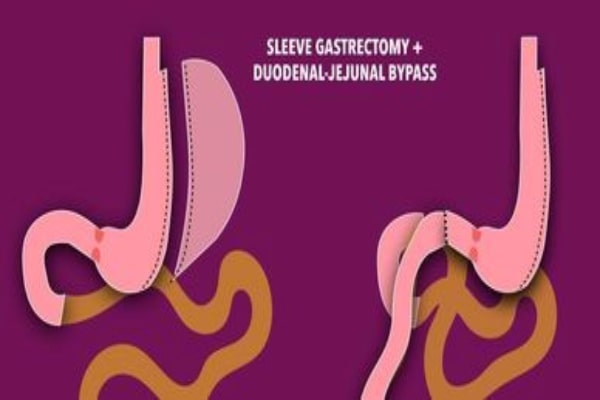Sleeve Duodeno-Jejunostomy
Home -> Sleeve Duodeno-Jejunostomy

- Laparoscopic Sleeve Gastrectomy
- Roux-en-Y Gastric Bypass Surgery
- Mini Gastric Bypass
- Endoscopic Sleeve Gastroplasty
- Single Anastomosis Duodenal Switch
- Duodenal Switch
- Revisions Surgeries
Overview
Sleeve Duodeno-Jejunostomy is a specialized bariatric surgery that combines two techniques: sleeve gastrectomy and duodeno-jejunostomy. It is typically recommended for patients who need significant weight loss and have specific health conditions, such as type 2 diabetes or metabolic disorders. This surgery aims to offer both restrictive and malabsorptive effects, providing a more effective solution for long-term weight loss.
How Does Sleeve Duodeno-Jejunostomy Work?
- Sleeve Gastrectomy:
The procedure begins with removing a portion of the stomach, leaving behind a tube-like structure, which limits the amount of food you can consume and reduces hunger hormones. - Duodeno-Jejunostomy:
The small intestine is rerouted so that the duodenum (the first part of the small intestine) is bypassed. The remaining portion of the small intestine is connected to the stomach pouch, which limits calorie absorption.
Benefits of Sleeve Duodeno-Jejunostomy
- Significant Weight Loss:
This combination of restriction and malabsorption leads to substantial and sustained weight loss, with patients typically losing a high percentage of excess weight. - Improved Metabolic Conditions:
It is particularly effective in treating obesity-related conditions like type 2 diabetes, hypertension, and fatty liver disease. - Dual Mechanism:
The procedure works by both restricting food intake and reducing nutrient absorption, offering better results than restrictive surgeries alone.
Risks of Sleeve Duodeno-Jejunostomy
- Nutritional Deficiencies:
The malabsorptive component of the surgery means that patients may need lifelong vitamins and minerals to avoid deficiencies. - Surgical Complexity:
As a combination surgery, it is more complex than single-procedure bariatric surgeries and comes with a higher risk of complications like infections or leaks.
Who is a Good Candidate for Sleeve Duodeno-Jejunostomy?
Patients who are severely obese and have not had success with other weight-loss surgeries or who suffer from metabolic conditions like type 2 diabetes may benefit from this procedure.
Conclusion
Sleeve Duodeno-Jejunostomy is an effective weight-loss surgery that combines the benefits of sleeve gastrectomy and duodeno-jejunostomy, offering patients significant weight loss and improvement in obesity-related conditions. It requires a commitment to lifestyle changes, including dietary adjustments and vitamin supplementation for long-term success.
